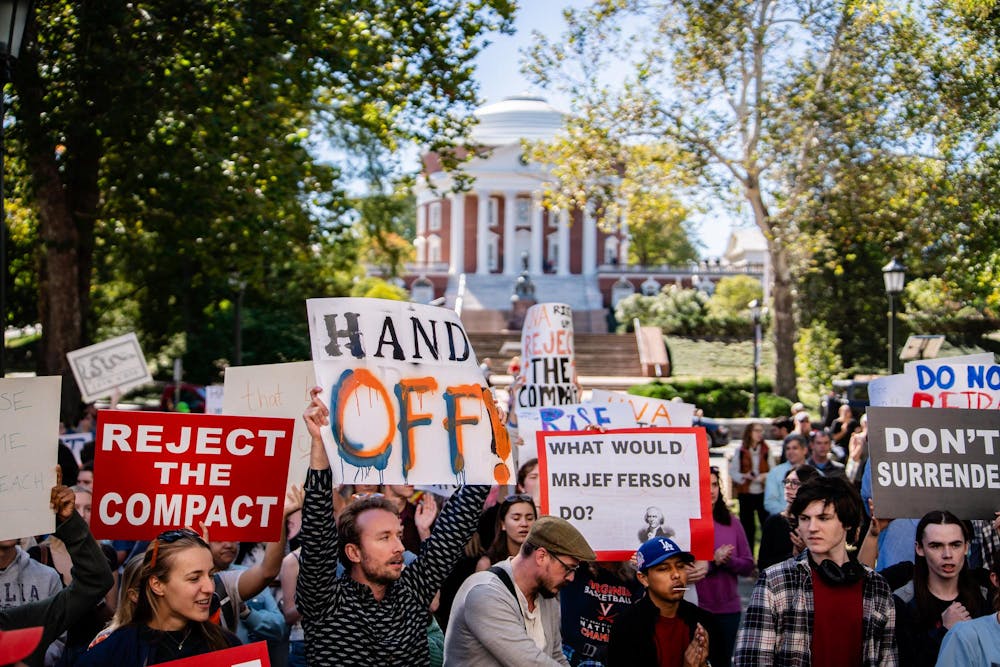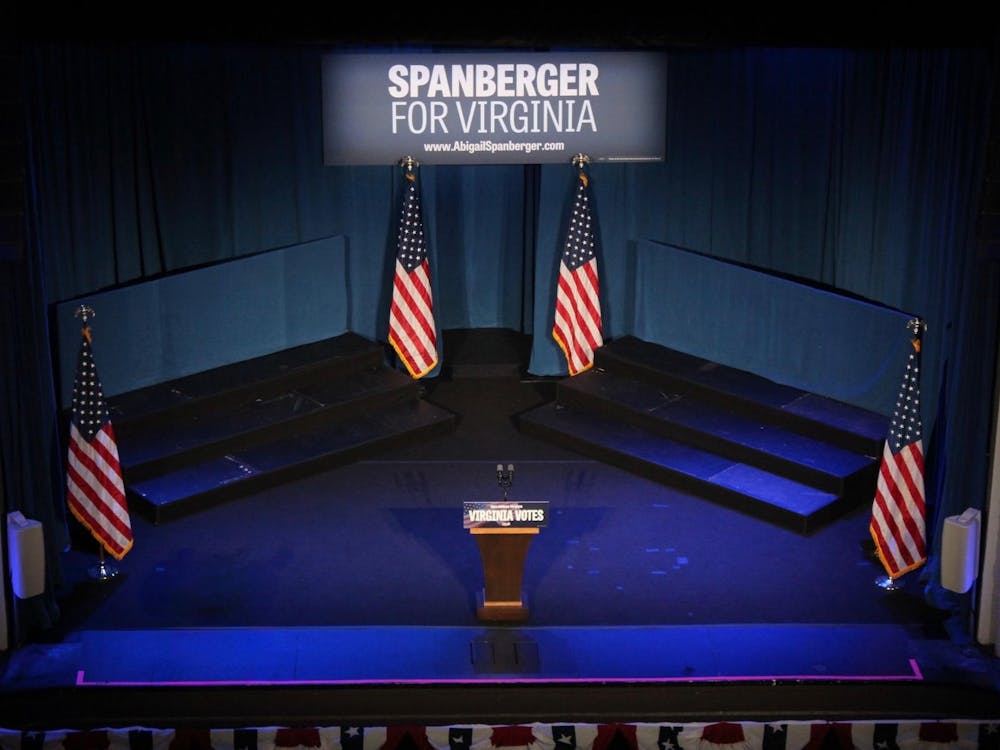More than one thousand students, faculty, staff and community members gathered on the Lawn at noon Friday to urge the University to reject the proposed Trump administration’s “Compact for Academic Excellence in Higher Education.” Friday evening, the University announced that it would formally reject the Compact.
The Compact proposes that universities must commit to a set of principles in exchange for priority in federal funding and partnerships. Among its stipulations are tuition freezes, the promotion of ideological diversity, the elimination of programs seen as hostile to conservative viewpoints and the vetting of international applicants for alignment with “American and Western values.”
The event was organized by members of a broad campus and community coalition, including AAUP-UVA, United Campus Workers-UVA, Concerned Faculty at UVA, the General Faculty Council, the Ad Hoc Group of Retired UVA Faculty, Jewish Voice for Peace, the National Campus Jewish Alliance-U.Va., Students for Justice in Palestine-U.Va.
The rally began at the Rotunda, where speakers — including faculty members, students, Student Council President Clay Dickerson and State Senator Scott Surovell — addressed the crowd and voiced their opposition to the agreement.
During the rally, protesters held up signs stating “DEFEND UVA” and “DON’T SURRENDER.” Other signs read “hands off our education” and “U.Va. cannot be bought.” Organizers distributed additional signs to participants before the march began.
Around 12:45 p.m., protesters began marching on the Lawn before continuing down McCormick Road near West Range. The march concluded at the University Avenue side of the Rotunda, where Brie Gertler, University Interim Executive Vice President and Provost, spoke to the crowd.
Chants such as “Hey hey! Ho ho! Trump’s Compact has got to go!,” and “When free speech is under attack, what do we do? Rise up, fight back!” echoed across Grounds. Sheets with chants were handed out to participants during the rally.
Second-year College student Eva Geisinger participated in Friday’s rally and emphasized the importance of student presence at protests.
“I think college campuses are where political change is often happening. It's a space where the youth of the generation have a chance to gather and make their voices heard,” Geisinger said. “It's especially important at U.Va., and it's especially important for students to show up, because they're the ones who are going to be directly affected by this on top of faculty and staff.”
Earlier that morning, faculty members held a press conference to share their concerns about the Compact.
Ann Brown, Wahoos4UVA co-chair and a University alum, spoke during the press conference and outlined the purpose of Friday’s protest.
“Today groups of faculty, students and alumni are gathering on the historic Lawn in front of its masterpiece, a library, our Rotunda to say with one voice that the Compact should be rejected in its entirety,” Brown said.
Brown went on to list five reasons why the Compact should be rejected — that it is contrary to the First Amendment, that it is a plea of agreement to offenses the University has not committed, that there is no mechanism to dissolve disputes around the Compact, that science should reward purely for merit and that it silences free inquiry and diminishes diversity of opinions.
Caitlin Wylie, United Campus Workers of Virginia member and Engineering professor, also spoke about the problems posed by the Compact.
“The real problem with this Compact is that it’s not a carrot, as the Trump administration is trying to convince us, it’s a stick. It is a threat of ever increasing control,” Wylie said.
Wylie also explained what steps she believes need to be taken after the Compact’s rejection.
“Rejecting the Compact is the first step … we can step forward and make a vision for what we want U.Va. to be or how U.Va. can be better. U.Va. works because we do,” Wylie said. “That means the faculty, staff, students, clinicians, practitioners, community members that call this place home and work and the place that we care about. It’s our collective contributions that entitle us to democratic self governance.”
At the press conference, Charles Matthewes, director of Graduate Studies and Religious Studies professor, also shared his thoughts on the University’s decision-making power.
“We have been given another chance today to live up to what we say we believe… you can still show you believe in the integrity and the autonomy of the academy, or that you do not,” Matthewes said. “Show us all that you understand the best example of what U.Va. will be. We, and you, and your and our students and the future will be watching.”
Later Friday, Interim University President Paul Mahoney sent an email to the University community that he had rejected the Compact, but looked forward to continuing to collaborate with the Trump Administration in the future.
The University was the fifth university to reject the Compact, following the Massachusetts Institute of Technology, Brown University, the University of Pennsylvania and the University of Southern California. Dartmouth College and the University of Arizona followed suit to the University and rejected the Compact Saturday and Monday, respectively.







